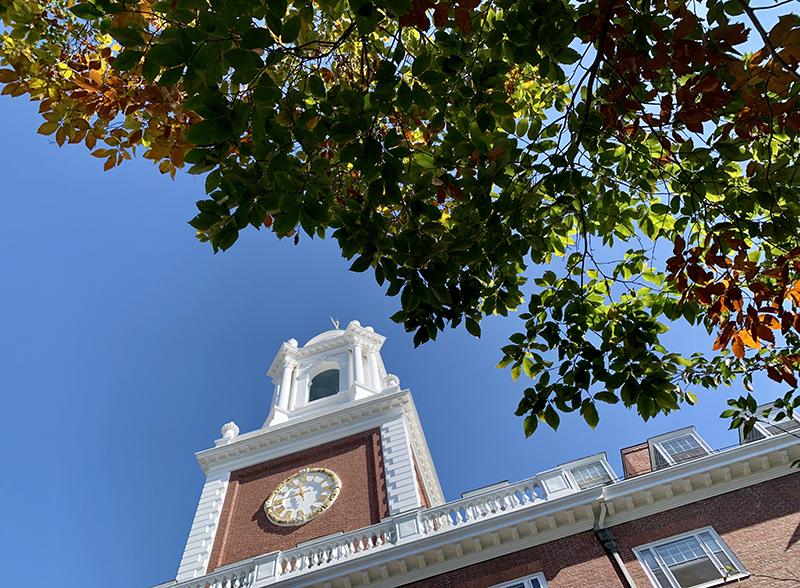Article
Dear Harvard College Parents and Families,
I am writing to share a message that was sent to our students earlier today related to the academic calendar for the spring semester. Thank you as always for your partnership during this unprecedented time, and I look forward to navigating next steps together.
Semper Veritas,
Rakesh Khurana
Danoff Dean of Harvard College
Dear Harvard College Students,
Earlier today, Dean Gay shared the following update on planning for the spring semester with faculty and staff, which I hope will be helpful in your considerations as well.
Notably, Dean Gay informed us that the upcoming semester will follow the regular academic calendar, with a modification as it relates to spring break vacation time. The full schedule is available for viewing on the registrar’s website.
We hope this information will allow you to begin to plan for the spring, understanding there is still more information about the spring semester to come. We continue to be guided by recommendations from public health experts, with a commitment to your health and well-being as we navigate the continued challenges of the pandemic. Thank you for your care for and commitment to our community as we move forward together.
Semper Veritas,
Rakesh Khurana
Danoff Dean of Harvard College
Dear colleagues,
I am writing to share an update on our planning for the spring semester, starting with a decision regarding the academic calendar.
The upcoming spring semester will follow the regular academic calendar, with classes starting on January 25 and ending on April 28. The five days of vacation normally taken as spring break will be re-allocated across the semester as scheduled wellness days, providing one day off from remote teaching and learning approximately every other week. A full schedule is now available on the registrar’s website. As was the case this fall, we anticipate that public health considerations will require us to minimize travel for our community in residence in order to manage the transmission of the virus on campus and protect our academic enterprise from disruption. This schedule supports that approach, while still recognizing the need for downtime (and time away from a screen) during the term. Following our regular academic calendar also avoids the introduction of schedule conflicts across Harvard Schools, which is a particular concern for graduate programs.
While the academic calendar is now set for spring, the question of when undergraduate students who will be learning in residence would arrive on campus is related but independent of the academic timeline. The Pandemic Planning and Response Group (PPRG) is actively reviewing move-in and move-out options as part of comprehensive planning for the spring undergraduate program that encompasses consideration of facilities adaptations, residential life, our public health practices, and the academic experience. While there is much more work ahead of us, we are on track to share the outcome of that planning early in December. (As a reminder, we have already provided an update on GSAS spring planning, which is available here.)
The midway mark of the semester is now behind us and early indicators of what the remote academic experience this fall has been like are favorable. Pulse surveys indicate that students are experiencing strong levels of engagement with faculty and teaching fellows in their courses, a factor identified as essential to successful remote learning. Also, the overwhelming majority of faculty report a positive experience with remote instruction. I am enormously grateful to the Office of Undergraduate Education and their partners in the Bok Center for Teaching and Learning, the Academic Technology Group, and the Division of Continuing Education for the training and other resources that were made available this summer and for their ongoing support of remote instruction. I am also grateful to the academic divisions and departmental leadership for creating opportunities for faculty to share their experiences in the remote classroom and to learn from one another. We are eager to harness the insights gained from these discussions to further strengthen the remote educational experience for the spring semester. To that end, faculty are encouraged to contribute their thoughts to a wiki discussion of how we might better support teaching and learning in the spring term. The Secretary of the Faculty will provide details on how to participate.
This planning is taking place against a backdrop of deteriorating public health conditions. Communities across the nation are seeing spikes in positive cases, and, on Monday of this week, thirteen Massachusetts cities and towns took a step back in their reopening because of a rise in coronavirus cases. Though current data on the incidence of the virus on our campus are encouraging, we must prepare for the possibility that the course of the pandemic will continue its current trajectory. Our spring decision must include robust contingency planning that enables us to respond quickly to changing conditions in order to protect the health and safety of our community and limit disruption to our academic activities. Just as importantly, each of our departments and programs should take the time to plan for downside scenarios.
Reaching a decision about the spring is an important milestone in our pandemic management, and I am eager to have our path forward in view. But I also appreciate that we undertake this planning as we continue to confront the day to day challenges of living and working in the pandemic. Some days it feels like we have been on one long Zoom call that started in March. Thank you for all of your hard work, care, and commitment to our teaching and research mission over that time, and for all to come in the months ahead.
Sincerely,
Claudine
__________________
Claudine Gay
Edgerley Family Dean of the Faculty of Arts and Sciences

